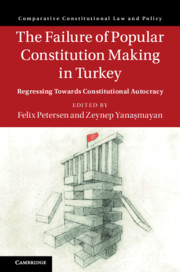Book contents
- The Failure of Popular Constitution Making in Turkey
- Comparative Constitutional Law and Policy
- The Failure of Popular Constitution Making in Turkey
- Copyright page
- Contents
- Figures
- Contributors
- Part I Introduction
- Part II Contextualizing Constitution Making in Turkey
- Part III Debating and Drafting the Constitution in 2011–2013
- 5 Debating State Organization Principles in the Constitutional Conciliation Commission
- 6 Glass Half Full: Drafting Fundamental Rights in the Turkish Constitution-Making Process (2011–2013)
- 7 Countermajoritarian Institutions in Turkish Constitution Making
- 8 Debating the Amendment-Making Rule: The Rigidity vs. Flexibility Debate in the Turkish Constitution-Making Process
- Appendices
- Index
7 - Countermajoritarian Institutions in Turkish Constitution Making
from Part III - Debating and Drafting the Constitution in 2011–2013
Published online by Cambridge University Press: 19 December 2019
- The Failure of Popular Constitution Making in Turkey
- Comparative Constitutional Law and Policy
- The Failure of Popular Constitution Making in Turkey
- Copyright page
- Contents
- Figures
- Contributors
- Part I Introduction
- Part II Contextualizing Constitution Making in Turkey
- Part III Debating and Drafting the Constitution in 2011–2013
- 5 Debating State Organization Principles in the Constitutional Conciliation Commission
- 6 Glass Half Full: Drafting Fundamental Rights in the Turkish Constitution-Making Process (2011–2013)
- 7 Countermajoritarian Institutions in Turkish Constitution Making
- 8 Debating the Amendment-Making Rule: The Rigidity vs. Flexibility Debate in the Turkish Constitution-Making Process
- Appendices
- Index
Summary
Countermajoritarian institutions have shaped the course of modern Turkish politics. Because they have mainly acted as institutions of military tutelage, they have been identified as one of the greatest obstacles to democratization. The most notable countermajoritarian institutions in Turkey are the Constitutional Court, the High Council of Judges and Prosecutors, the National Security Council, and the Council of Higher Education. This chapter analyzes the deliberations on possible reform to these institutions in the writing commission of the Constitutional Conciliation Commission ‘Anayasa Uzlama Komisyonu, AUK’ from 2011 to 2013. It shows that delegates agreed on some issues and were close to reaching agreement on others. Yet, the requirement of consensus among all parties enabled certain actors to obstruct final agreements. The partial agreements ultimately yielded no lasting results. After adoption of constitutional amendments in 2017, it seems that countermajoritarian institutions now function as institutions of partisan, executive tutelage.
Keywords
- Type
- Chapter
- Information
- The Failure of Popular Constitution Making in TurkeyRegressing Towards Constitutional Autocracy, pp. 218 - 248Publisher: Cambridge University PressPrint publication year: 2020



